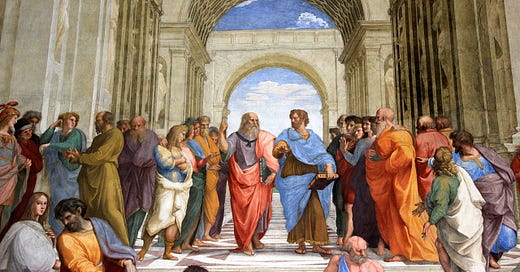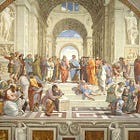Modern society has aged out of the Socratic dialogue. They’re much too thoughtful, much too humble. But back in ancient Greece, they were a whole literary genre. Plato wrote a ton of them. So did Xenophon, Aristotle. A whole bunch of Greek philosophers.
All of these dialogues follow a similar formula, which goes like this: someone dares to get in an argument with Socrates. They start out confident, and then Socrates picks the whole thing apart using logic and the person realizes that they actually had no idea what they’re talking about.
They’re fun. Really fun, actually, and what’s interesting about them is that Socrates hardly ever actually asserts an opinion of his own.
After all, the main objective of a Socratic dialogue is to impress upon the reader this one fact:
“The only true wisdom is knowing you know nothing.”
Well, the quote goes something like that.
This was Socrates’ whole thing—teaching people how to think, showing them that they shouldn’t be so confident in the beliefs that they assert. Consequently, his philosophy is more of a method—or even an art—than a doctrine.
And it’s an art that has been lost in the modern world. We don’t write these things anymore. I’m not even talking about the ‘pure’ form of Socratic dialogue, in which Socrates is the main character. In any of our literature in which characters argue, their arguments are nowhere near as rational. (Perhaps there are few exceptions. If you know any, tell me.) As a society, we’re too lazy for logic.
We don’t value logic. We don’t teach our children how to use logic. We’ve never learned it ourselves.
On Friday, I wrote a post about the absolute shame it is that people no longer learn Latin and Greek, when these used to be the basis of a ‘liberal arts’ education (liberal meaning, in this situation, free). The teachings of these ancient philosophers formed the basis of a free society full of thinking people. If we forget this foundational knowledge, then everything we’ve built on top of it will begin to crumble.
It was originally a post for paid subscribers, but I’ve opened it up to everyone because I think it’s important. Read it here.
Well, the ‘liberal arts’ education is dead, and as a consequence, people are not thinking rationally—or holistically—anymore. Everyone is a specialist. Everyone is an expert. And no one knows anything at all.
I picked up the Oxford History of Britain recently to supplement my knowledge for a project I’m working on. It’s quite a dense book to begin. I read the introduction, written by the editor Kenneth O. Morgan, and was struck by one remark:
“This is, inevitably, a multi-author volume, written by ten professional historians in close collaboration with one another. Such a collective approach is inescapable, since the days when one compendious mind such as Trevelyan’s could have the capacity and confidence to treat all aspects of British history with equal ease probably died with the Liberal intelligentsia some time after 1914. It is certainly neither practicable nor desirable, now that Renaissance men have vanished from the earth.”
If this isn’t the perfect illustration of what happens when we forget how to think, I don’t know what is. Everyone’s a self-proclaimed expert in their own tiny field, and it’s of no consequence, because no one can see the big picture.
Socrates would have a field day.
Of course, while Socrates might be considered the original ‘Renaissance Man’ (Jack of all trades, master of none), he (obviously) wasn’t a part of the Renaissance period of history at all. The Renaissance wouldn’t happen until the 14th century C.E.—over a thousand years after the days of the great ancient Greek philosophers.
In that time, civilizations rose and fell. Europe underwent the ‘Dark Ages.’ The word ‘renaissance’ signifies rebirth—people started thinking again, after they ostensibly hadn’t in any meaningful way for centuries.
And of course, free thought has rarely been popular. Socrates was executed. Plato was forced to leave Athens. Even Leonardo Da Vinci had his own share of legal problems. Philosophy has always been the domain of the brave.
Modern philosophers lack this courage. The modern world has lost this intellectual curiosity—this drive to venture into uncharted waters. Our technology is unrivaled. But our wisdom—well, let’s just say these things seem to be inversely proportional.
In other words, it’s time to start thinking again.





